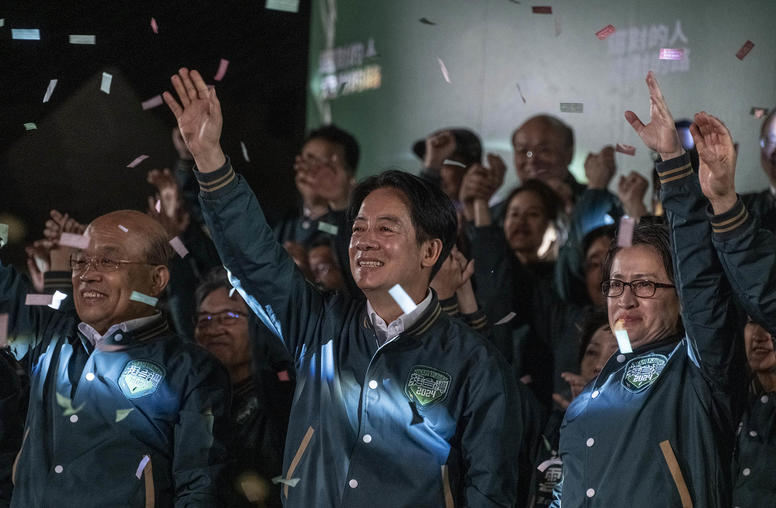Publications
Articles, publications, books, tools and multimedia features from the U.S. Institute of Peace provide the latest news, analysis, research findings, practitioner guides and reports, all related to the conflict zones and issues that are at the center of the Institute’s work to prevent and reduce violent conflict.

Taiwan’s New President Faces Tensions with China and Domestic Division
Over four months after winning Taiwan’s presidential election, William Lai Ching-te from the ruling Democratic Progressive Party (DPP) officially took office on May 20. Beijing fiercely criticized Lai’s inaugural address and conducted military drills and patrols around Taiwan in a bid to “punish” Lai for failing to heed China’s preferred positions. In the days following the speech, Lai also faced challenges at home, as opposition parties in Taiwan’s legislature passed a set of reform bills that critics warn could increase China’s ability to interfere in Taiwan’s domestic affairs.

After Taiwan’s Election, China Is Now Ratcheting Up the Pressure
Beijing is intensifying its pressure on Taiwan’s freshly elected president, William Lai Ching-te. Instead of relying on conventional military or economic pressures, however, Beijing has employed multifaceted tools of coercion to demonstrate disapproval of the January election results. Although China is carefully calibrating its behavior to avoid provoking Taipei or the United States, Beijing’s efforts to gradually change the status quo and erase the traditional boundaries between Taiwan and China could lead to escalated tensions and unintentional conflict.

What Does the Xi-Ma Meeting Mean for Cross-Strait Relations?
Chinese leader Xi Jinping held talks on April 10 with former Taiwan president Ma Ying-Jeou in Beijing’s Great Hall of the People. The meeting came as tensions between Beijing and Taipei remain high, particularly following Taiwan’s election at the beginning of the year, which saw pro-sovereignty candidate William Lai Ching-te win a historic third term for the ruling Democratic Progressive Party (DPP). Ma served as president from 2008 to 2016, is a member of the Nationalist (KMT) party and is known for advocating closer ties with mainland China.

From Dams to Data: China’s Shifting Interests in Central America
China continues to face economic headwinds, marked by reports this week of a protracted property slump. To address its mounting economic and financial challenges, Beijing is implementing a new industr

As Taliban Poppy Ban Continues, Afghan Poverty Deepens
Afghanistan, historically the leading source of the world’s illegal opium, is on-track for an unprecedented second year of dramatically reduced poppy cultivation, reflecting the Taliban regime’s continuing prohibition against growing the raw material for opiates. The crackdown has won plaudits in international circles, but its full implications call for clear-eyed analysis and well considered responses by the U.S. and others. The ban has deepened the poverty of millions of rural Afghans who depended on the crop for their livelihoods, yet done nothing to diminish opiate exports, as wealthier landowners sell off inventories. The unfortunate reality is that any aid mobilized to offset harm from the ban will be grossly insufficient and ultimately wasted unless it fosters broad-based rural and agricultural development that benefits the most affected poorer households.

The Relationship Between Social Media and Violence in Papua New Guinea
The online sharing of gruesome images and videos showing dead and dismembered bodies on social media is commonplace in Papua New Guinea (PNG). For instance, when a horrific massacre took place in Enga province in February this year, it was images shared on WhatsApp that alerted many to the violence.

How Disruptive Technologies Are Changing Peace and Security
The global landscape of violence and conflict is transforming at a rapid pace, as disruptive technologies revolutionize how wars are waged. For years, security forces and intelligence agencies have been steeped in the dynamic threats posed by new technologies and they regularly use advanced tools to respond to those threats. Diplomats and peacebuilders, however, may often neglect threats from disruptive technologies due to an overreliance on historical power dynamics; a lack of creative thinking fostered by elite, risk-averse cultural pressures; and a disconnect from local communities where violence occurs. Tech illiteracy hampers understanding of how emerging technologies are used and how they can exacerbate conflicts.

In Pyongyang, Putin and Kim Tighten Ties, Pledge Mutual Defense
As President Vladimir Putin’s illegal war on Ukraine grinds on, the Russian leader needs friends and supporters wherever he can get them. To that end, Putin traveled this week to North Korea for the first time in nearly 25 years, looking to deepen cooperation with the rogue regime and, chiefly, to get more ammunition for his war on Ukraine. Putin and Kim Jong Un inked what the North Korean leader called “the most powerful treaty” ever between the two countries. While strengthened ties between two of Washington’s most enduring adversaries are of unquestioned concern for the U.S., Beijing is also wary of the implications.

Gaza at the G7: The Daunting Divide between Rhetoric and Reality
The ongoing war in Gaza was only one of several items on the agenda for last week’s summit of leading Western economies, known as the Group of 7 (G7). But, given the global attention on Gaza and coming on the heels of the Biden administration’s most recent push to achieve a cease-fire — including sponsorship of a U.N. Security Council resolution toward that end — questions around the prospects for a negotiated pause in fighting and hostage agreement dominated the discussions.

El Resultado de las Elecciones en Venezuela Aún No Está Decidido
Con menos de dos meses para las elecciones presidenciales en Venezuela, el presidente Nicolás Maduro enfrenta una decisión crucial. Si es derrotado en las urnas, como sugieren las encuestas, Maduro podría aceptar la derrota y negociar un traspaso de poder con protecciones contra persecución legal. O podría intentar robarse o invalidar la elección. La mayoría de los observadores asumen que Maduro optará por lo último, pero hacerlo podría ponerlo en un riesgo personal aún mayor.